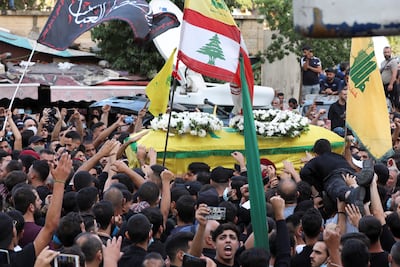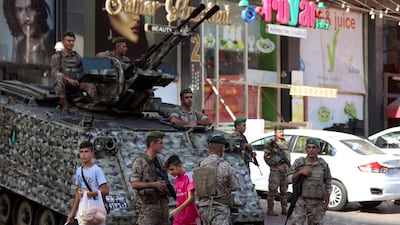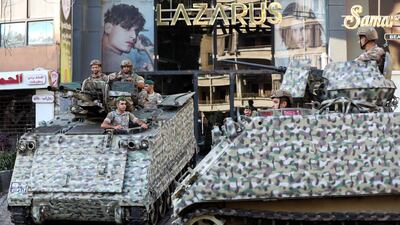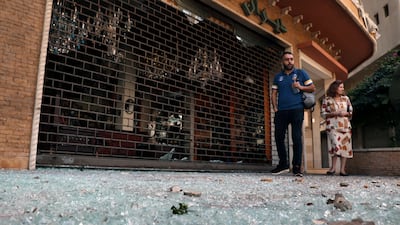Army checkpoints lined the deserted main road in the Tayouneh and Chiyah areas of Beirut on Friday morning after a day of intense fighting between Hezbollah, its allies and unknown gunmen.
Tanks from the Lebanese army’s Elite Commando Unit were stationed in the districts, where seven people were killed and at least 30 injured on Thursday.
The area was a front line during the Lebanese civil war.
Residents said the violence compounded the trauma caused by the Beirut port explosion last year, and sparked fears of renewed sectarian tension as the country enters its second year of economic meltdown.
Hassan Charbes, 45, said the shootings rekindled painful memories of Lebanon’s 1975-1990 civil war and shocked his nine-year-old son, who had yet to recover from the emotional effects of last year's port blast.
“I took my children in my arms and we went to hide away from the windows as soon as I heard gunshots,” he said.
The August 2020 blast killed more than 200 people, injured more than 6,000 and destroyed large areas of the capital.
One year on, no one has been held accountable for the explosion, with politicians repeatedly accused of impeding investigations.
Hezbollah stepped up efforts to remove the judge leading the probe into the blast this week after he issued an arrest warrant for former finance Minister Ali Hassan Khalil.
Mr Khalil failed to appear after being summoned for questioning about his role in events that led to the explosion.
The clashes began just before a planned Hezbollah protest against the judge, Tarek Bitar, on Thursday.
Mr Charbes said he feared for his son.
“He was terrified yesterday, he is still scared,” he said.
It remains unclear exactly what exactly sparked the clashes.
Hezbollah and its ally the Amal movement said that snipers of the Christian Lebanese Forces set a trap for protesters and shot at them around the time of the gathering.
The leader of the Lebanese Forces, Samir Geagea, blamed the escalation on the proliferation of weapons, a veiled reference to Hezbollah's arsenal.
Ali Toufaili, 38, works in a building in the Chiyah area, where several residents told The National a sniper was operating.
“I think the snipers may have been hiding in buildings behind us,” he said, pointing at a grey building, its top floor riddled with bullets.

Mr Toufaili was in his office with employees when bullets came careening through the windows, sending them running for their lives to the back of the office.
Bullets punctured the balcony of his office, and its floors were covered in shards of glass that cleaners had just begun to collect.
“There is no indication that people in this building have a different background from the side that was shooting at them,'' he said, admitting that he was puzzled by the events that unfolded on Thursday.
Calls for retaliation
A group of Amal and Hezbollah supporters, some of whom marched in yesterday’s protests, told The National that they were angry over the clashes.
At least six of the seven people killed were members or supporters of Hezbollah and Amal. The incident marked the second deadly sectarian clash in just months. A vendetta killing in June took the lives of at least four of the group's supporters in Khalde, south of Beirut.
Funerals for Thursday's dead were held on Friday as the country took part in a day of mourning declared by Prime Minister Najib Mikati.
Speaking at the funerals, senior Hezbollah leader Hashem Safieddine accused the Lebanese Forces of trying to start a civil war.
"Because they know that we don't want civil strife, they dared to do that," he said. "We will not be dragged into civil war but at the same time we will not let the blood of our martyrs be in vain."
Back at the site of the fighting, Jad, 37, said he wanted the leadership of the group to retaliate.
He said Hezbollah did not fight back after the Khalde killings to avoid another civil war.
“And now our leaders are also asking us to stay put? We’re not happy with this. We’re not happy at all,” he said.
“We’re not the kind to get slapped and say thank you.”
Clothing shop owner Suzanne Dia said the fighting had left her feeling like her country now belonged to militiamen.
“Lebanon does not belong to people like me any more. Lebanon belongs to those who were shooting right and left,” she said, picking up pieces of glass from her shattered storefront.
“We have no future, no work, and now this,” she said of Thursday’s events.
Her boutique was destroyed in the Beirut blast last year and, just as she began to get the store back on its feet, it incurred damage in Thursday's gunfight.
“You get beaten over and over again and all you can do is brush it off and move on. That’s what life feels like in Lebanon,” she said.











